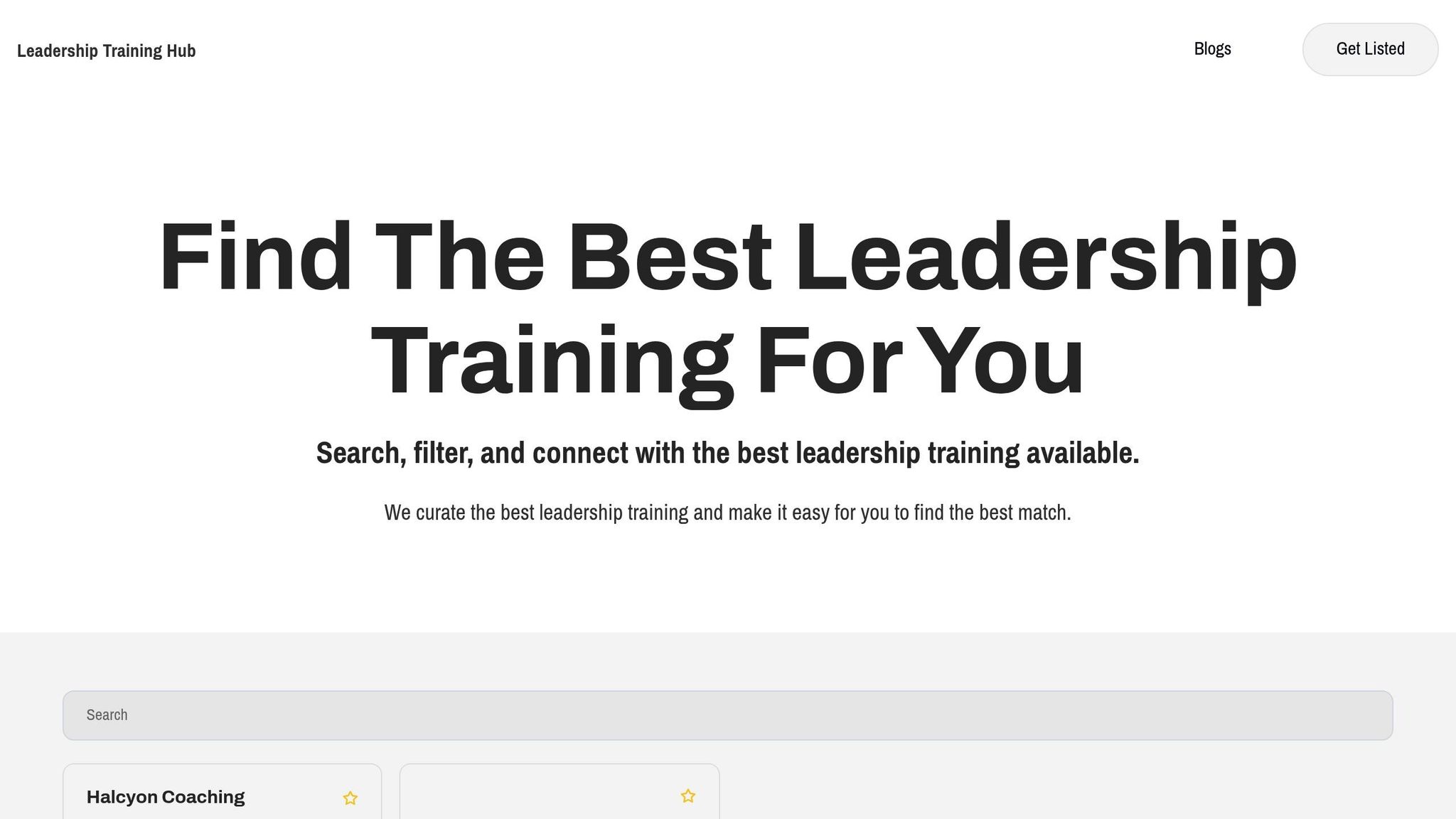Leadership certifications in the UK are structured programmes designed to build leadership skills and validate your ability to manage teams and projects. These certifications are highly regarded by employers across industries and can significantly boost your career prospects, earnings, and personal development. Here’s a quick breakdown:
- What It Is: A formal qualification combining theory, practical exercises, and case studies to develop leadership competencies.
- Why It Matters: Employers value certified leaders for their proven expertise. Certifications often lead to promotions, salary increases, and improved organisational performance.
- Key Benefits:
- Higher earnings: Average salary boost of £13,600; 31% report promotions.
- Personal growth: Better self-awareness, communication, and decision-making.
- Organisational impact: Certified leaders improve team performance and strategy.
- Costs:
- Entry-level: Free to £1,000.
- Mid-range: £700–£2,650.
- Premium: Up to £40,000 for executive programmes.
- Funding Options: Government scholarships, employer sponsorships, grants, and flexible payment plans can make these programmes affordable.
To get started, choose a programme that aligns with your career goals, learning style, and budget. Leadership certification is an investment in both your professional and personal growth.
Everything You Need To Know About CMI (Chartered Management Institute)

Benefits of Leadership Certification
Leadership certification can be a game-changer for both your career and personal growth. It’s not just about enhancing your CV; it’s about unlocking new opportunities, improving your effectiveness as a leader, and achieving measurable gains in your professional and personal life.
Professional Advantages
Better Career Prospects and Higher Earnings
Earning a leadership certification can give you a competitive edge in the job market. According to Harvard Business School Online, 42% of participants reported salary increases averaging £13,600, while 20% experienced bonus boosts of around £11,200. Additionally, 31% of learners received promotions directly linked to their certification, and those who completed leadership training were 44% more likely to be promoted within a year. These credentials not only validate your skills but also build trust with employers, making you a more attractive candidate for leadership roles.
Sharper Decision-Making and Strategic Thinking
Leadership programmes are designed to sharpen your critical thinking and problem-solving abilities. These skills are essential for navigating complex business decisions and adapting to unexpected challenges. By enhancing your strategic thinking, you’ll be better equipped to steer your organisation through uncertainty and change.
Boosted Organisational Performance
Certification doesn’t just benefit individuals - it can also have a ripple effect on organisations. Certified leaders bring improved management strategies and team-building techniques to the table, creating a culture of high performance. Research shows that companies investing in comprehensive leadership training are 4.2 times more likely to outperform those that limit such initiatives to senior executives.
But the benefits don’t stop at professional gains. Leadership certification also promotes personal development.
Personal Development Benefits
Greater Self-Awareness and Emotional Intelligence
A key focus of leadership certification is helping you understand your leadership style, strengths, and areas for improvement. This self-awareness is crucial for effective leadership. Training programmes often include structured feedback and hands-on experiences, which build confidence and encourage you to try new approaches in a supportive setting.
Stronger Communication and Interpersonal Skills
Good leaders know how to communicate effectively. Certification programmes refine your ability to motivate teams, resolve conflicts, and think creatively to solve problems. These skills can help you stand out from your peers and lead with impact.
Stress Management and Adaptability
Leadership training also equips you with tools to manage stress and adapt to changing circumstances. By fostering a mindset of lifelong learning, these programmes ensure you’re prepared for sustained growth in your career. As Marshall Goldsmith and Sam Shriver put it:
"Leadership is really all about learning, and learning is really all about leadership".
Benefits and Limitations Comparison
| Benefits | Limitations |
|---|---|
| Salary & Bonus Gains: Average salary increases of £13,600 and bonus increases of £11,200 | Cost Investment: Executive programmes at top business schools can cost several thousand pounds |
| Promotion Rates: 31% promotion rate and 44% higher likelihood of promotion within one year | Time Commitment: Programmes require significant time, potentially affecting work–life balance |
| Performance Improvement: 25% increase in learning and 20% improvement in job performance | Quality Variation: Course quality differs between providers |
| Organisational Impact: Companies 4.2 times more likely to outperform with comprehensive training | Customisation Needs: Generic programmes may not suit all leadership styles |
| Goal Achievement: 99% of participants met goals like improving communication and self-awareness | Practical Application: Some courses may lack real-world relevance |
While there are challenges, such as cost and time investment, the benefits of leadership certification often outweigh these drawbacks. A survey by the Center for Creative Leadership found that 99% of participants achieved their goals of improving communication and self-awareness, and 97% felt better prepared to tackle leadership responsibilities. In 2015 alone, companies worldwide spent about £285 billion on leadership development, highlighting the value placed on these programmes. If you choose a programme that aligns with your personal and career aspirations, the rewards can be transformative.
Choosing the Right Leadership Certification Programme
Now that we've explored the benefits of leadership certification, it’s time to focus on selecting a programme that suits your career goals and learning style. The right choice can mean the difference between a rewarding growth opportunity and an expensive misstep.
Key Selection Criteria
Accreditation and Recognition
Ensure the programme you choose is accredited by respected organisations. Accreditation confirms that the curriculum meets industry standards, making your certification more credible to employers. Look for programmes linked to established business schools, professional bodies, or organisations with a strong track record in leadership development.
Experience Level and Curriculum Fit
Pick a programme that matches your leadership experience. A course aimed at senior executives won’t be as helpful for someone new to management, and vice versa. Make sure the curriculum aligns with your career goals, whether you want to enhance strategic thinking, improve team management, or master change leadership.
Programme Format and Flexibility
Decide whether a virtual, in-person, or blended format works best for your schedule and learning preferences. Flexibility can be especially important if you’re balancing work and personal commitments.
Duration and Time Commitment
Leadership programmes vary widely in length, from short, intensive courses to part-time options spread over several months. Consider your workload and personal responsibilities to avoid overloading yourself.
Cost vs. Benefit
Always weigh the cost against the potential return. Leadership development can yield a return of approximately £7 for every £1 invested. If your employer offers funding, this can further justify the expense.
Practical Application
Look for programmes that provide real-world, hands-on learning opportunities. The ability to immediately apply what you learn can greatly enhance the value of your training.
Once you’ve considered these factors, the next step is to evaluate the credentials of the programme providers.
Researching Programme Providers
Provider Credentials and Reputation
Choose providers with recognised accreditation and a proven history in leadership training. Check whether they employ experts in the field and if their work has earned industry awards or recognition. The best providers tailor their training to meet the needs and culture of specific organisations.
Client Feedback and Case Studies
Client testimonials and case studies can offer valuable insights into a programme’s effectiveness. For instance, a Siemens Energy case study highlighted that participants in their Institute Approved programme felt it not only provided a good learning experience but also led to meaningful behavioural changes. This kind of feedback shows how impactful the training can be in fostering a high-performance workplace culture.
Training Methods and Support
Examine the provider’s teaching approach. Effective programmes often include interactive elements such as Q&A sessions, gamification, and feedback opportunities to keep learners engaged. Also, consider if they offer additional support like coaching, mentoring, or team-building activities to create a comprehensive learning experience.
Alignment with Your Organisation
Ensure the provider’s values and teaching methods align with your organisation's culture and your personal learning style. If possible, meet the trainer beforehand to assess whether their approach resonates with you. A good rapport can elevate a programme from merely effective to genuinely impactful.
Using Leadership Training Hub

To simplify your search, consider using Leadership Training Hub. This platform acts as a central directory, connecting you with leadership programmes, courses, and resources across the UK. It offers options from boutique consultancies to large organisations, covering areas like emotional intelligence, executive transitions, change leadership, and team agility.
Wide Range of Providers
Whether you prefer the tailored approach of a boutique firm or the extensive resources of a larger organisation, Leadership Training Hub features a variety of options to suit different budgets, needs, and learning preferences.
Effortless Research
The platform helps you quickly identify programmes that match your criteria. It provides essential details about each provider, allowing you to create a shortlist for further research.
As Harvard Business School Professor Joshua Margolis aptly puts it:
"Leadership is sometimes misunderstood as a mystical quality that some people embody and others don't".
The right certification programme can help you develop practical, teachable skills to enhance your leadership effectiveness. Take the time to research thoroughly - choosing wisely will pay off throughout your career.
sbb-itb-fa39ac2
Eligibility Requirements and Application Process
Before diving into a leadership certification programme, it’s important to understand the eligibility requirements and how to navigate the application process. The good news? These programmes cater to professionals at different career stages, offering a range of entry criteria.
Eligibility Criteria
Educational Background
The educational requirements for leadership programmes can vary widely. Some have no formal prerequisites. For example, the BCS Professional Certificate in Team Leadership is open to applicants regardless of their academic history.
On the other hand, more structured programmes often have specific academic expectations. For instance, the Elizabeth Garrett Anderson programme, aimed at middle to senior healthcare leaders, requires GCSE maths and English at grade C or above (or equivalent). Advanced programmes may ask for a 2:2 honours degree with three years of management experience, a degree with five years' experience, or, in the absence of a degree, five years of management experience with clear career progression.
Work Experience
Practical experience is a cornerstone of most leadership certification programmes. Many require candidates to already hold a leadership or managerial position. This ensures participants can immediately apply what they learn and actively contribute to discussions by sharing their real-world experiences.
Sector-Specific Criteria
Some programmes, particularly those in the public sector, have stricter requirements. For example, public sector-focused initiatives often target senior professionals, such as NHS CEOs, university vice-chancellors, or high-ranking civil servants. The Leadership College for Government collaborates with public sector bodies to establish and review these eligibility standards.
Age and Legal Requirements
Most programmes stipulate that applicants must be at least 18 years old and have the right to work in the UK.
Once you’ve confirmed your eligibility, the next step is crafting a strong application.
Application Steps
If you meet the criteria, here’s how to approach the application process effectively.
Organising Your Documents
A strong application starts with well-prepared documentation. For example, the Southern Regional College Level 5 Certificate in Leadership and Management requires applicants to submit photographic ID, proof of qualifications, and an employer letter confirming their leadership role.
Ensure you have clear copies of your certificates and a detailed letter from your employer outlining your leadership responsibilities.
Showcasing Leadership Potential
Meeting the minimum requirements is just the starting point. To stand out, your application should reflect your leadership qualities and potential. Leadership expert SunDeep Mehra explains:
"Leadership programs do not make people leaders... Leadership is not taught→it's remembered. Leadership is not earned→it's embodied. Leadership is not appointed→it's awakened."
Highlight your passion for leadership, your drive to make things happen, and your ability to inspire others. Include specific examples of initiatives you’ve led, challenges you’ve overcome, and how you’ve gone beyond expectations to achieve results.
Crafting Your Story
Your application should tell a compelling story about your leadership journey. Share examples of how you’ve led teams through tough situations, adapted to challenges, and motivated others to succeed. Leadership development expert Ross Wirth underscores the importance of self-awareness:
"If you cannot answer this question yourself, you probably should not (and will not) be chosen for a leadership program. Leadership is a choice - one you must make yourself and you must know why you see value to the organisation through your leadership of others."
Collaborating with Your Organisation
Before applying, have a conversation with your manager about your leadership goals. This discussion can help align your certification plans with your organisation’s objectives and your career trajectory. Many employers actively support leadership development and may even sponsor your participation. In some cases, employer approval is a requirement for application.
Planning Ahead
Application deadlines vary. Some programmes have rolling admissions, while others operate on specific intake schedules. Popular programmes often have limited spots, so applying early can improve your chances.
Make sure to account for time needed to collect documents, especially employer confirmation letters, which may take a while to process. Additionally, some programmes may require interviews or assessments, so factor in extra time for these steps.
With your application ready, it’s time to explore the costs and funding options for leadership certification.
Costs and Funding Options for Leadership Certification
After considering programme quality and eligibility, understanding the financial side of leadership certification is essential. Costs can vary widely, but there are numerous funding options available in the UK that can make these programmes more accessible than you might think.
Typical Cost Ranges
Leadership certification costs in the UK span a broad spectrum, from free options to high-end programmes exceeding £40,000.
Entry-Level Certifications
For those just starting, there are affordable options. For instance, the Level 2 Certificate in Principles of Team Leading is free if you meet specific funding criteria. Similarly, the Emotionally Intelligent Leadership course ranges from £45 to £140 (excluding VAT), and the Advanced Professional Certificate in Leadership and Management is available for £99 (excluding VAT), discounted from £400.
Mid-Range Professional Programmes
Mid-tier programmes offer a balance between cost and value. Examples include the Leadership Management Training Course (£700–£875, excluding VAT), the CMI L3 Award in Principles of Management & Leadership (£1,795, excluding VAT), and the Oxford Executive Leadership Programme (£2,650). These programmes are ideal for building on foundational skills and advancing your career.
Premium Executive Programmes
At the higher end, London Business School offers several prestigious courses. These include the Women in Leadership programme (£8,950), High Performance People Skills for Leaders (£10,200), and Leading the Family Office (£12,000). For those seeking advanced strategic training, the Senior Executive Programme costs £40,300.
Specialist and Sector-Specific Programmes
Some certifications cater to niche areas and come with premium pricing. For example, London Business School’s Supply Chain Executive Leadership programme is priced at £24,000, while the Accelerated Development Programme costs £30,500.
Given the diversity in pricing, exploring funding options can significantly ease the financial burden.
Funding Opportunities
A range of funding mechanisms can make leadership certification more affordable. In many cases, financial barriers are lower than they initially seem.
Government Funding Schemes
The Department for Education (DfE) provides scholarship funding for National Professional Qualifications (NPQs) for eligible teachers and leaders. According to the DfE:
"You may be able to get your NPQ course fees paid for by the Department for Education (DfE). This is called scholarship funding. You do not need to apply for it."
Additionally, the Help to Grow: Management Course is 90% government-funded for eligible small and medium enterprises.
Employer Sponsorship
Employers often support leadership development, recognising its value. Research indicates that 87% of UK employers appreciate leadership and management qualifications. When discussing certification with your employer, focus on how it aligns with your role and the organisation’s goals.
Grant Programmes
Grants can substantially reduce out-of-pocket costs. For instance, Impellus offers a £2,000 grant per individual for structured development programmes. This means the Level 3 Certificate of Learning in Leadership and Management, priced at £2,596, costs just £596 after the grant. Similarly, the Level 5 Certificate, originally £3,245, is reduced to £1,245 with the grant.
Flexible Payment Options
Many programmes allow you to spread costs over time. For example, Level 5 leadership and management courses, lasting 6 to 9 months, can cost between £950 and £1,250, depending on the payment plan.
Sector-Specific Funding
Certain industries offer tailored funding opportunities. For example, in January 2025, Centred Excellence provided up to £1,000 in matched funding for leadership training for recruiters in England, specifically for businesses with fewer than 249 full-time employees.
Cost Comparison Overview
| Programme Level | Typical Price Range | Duration | Funding Options | Best For |
|---|---|---|---|---|
| Entry-Level Certifications | Free to around £1,000 | 1–6 months | Government funding, employer support | New managers, team leaders |
| Mid-Range Professional Programmes | Approximately £700–£2,650 | 6–12 months | Grants, instalment plans, employer support | Experienced managers |
| Premium Executive Programmes | £8,950 to over £40,000 | 1–24 months | Corporate sponsorship, personal investment | Senior leaders |
| Specialist and Sector-Specific | £24,000–£30,500 | Varies | Specific grants, sector-related funding | Industry specialists |
To manage costs effectively, it’s essential to explore all funding options. With government scholarships, employer sponsorship, grants, and flexible payment plans available, leadership certification can be more accessible than it initially appears.
Key Takeaways
Leadership certification offers a pathway to both career advancement and personal development, catering to professionals at all stages and budgets. The first step is to define your goals and align them with the right programme.
Summary of Benefits
Earning a certification can boost your career, often leading to promotions and salary increases. Beyond the tangible rewards, these programmes help build confidence, sharpen decision-making abilities, and nurture emotional intelligence. Whether you’re managing a small team or spearheading organisational change, these skills can make a real difference in your professional journey.
Next Steps for Aspirants
If you’re ready to start your certification journey, here’s a roadmap to guide you:
- Find the right fit: Align CMI qualifications with your current role and career aspirations. Whether you’re at an entry-level position, mid-career, or in an executive role, there’s a tailored option to help you achieve Chartered Manager status.
- Choose your learning style: Decide whether online courses, in-person classes, or on-site corporate training suits your needs and budget.
- Understand the requirements: Check eligibility criteria and download syllabi to get a clear picture of programme content.
- Research providers: Use the Leadership Training Hub to compare providers based on testimonials, fees, and funding options.
- Take the next step: Reach out to course providers for detailed information on costs and funding opportunities.
- Consider sector-specific programmes: If you work in a specialised field like healthcare, explore targeted options such as those offered by the NHS Leadership Academy.
Now’s the time to take action. Leadership certification is an investment in your future, and with so many options available across the UK, there’s bound to be a programme that aligns with your career goals.
FAQs
How do I choose the right leadership certification programme for my career goals and experience?
When selecting a leadership certification programme, start by clarifying your career ambitions and evaluating your current skill set. Choose a programme that hones in on the leadership qualities you aim to strengthen and is respected within your industry. It's essential to ensure the certification aligns with your professional goals - whether you're aiming for a senior management role or looking to specialise in a specific leadership area.
Take a close look at the programme's eligibility requirements to confirm it suits your level of experience. Also, consider the practical advantages it offers, like opportunities to expand your professional network, boost your credibility, or enhance your career prospects. By carefully aligning the programme with your unique goals and needs, you can ensure it becomes a valuable step in advancing your career.
What financial support is available to reduce the cost of leadership certification in the UK?
In the UK, there are various funding avenues to help offset the cost of leadership certification. Government-funded programmes are a great starting point. For example, scholarships for National Professional Qualifications (NPQs) and the Help to Grow: Management Course, which covers 90% of the fees, can make these certifications much more affordable. Employers may also have access to grants aimed at supporting staff development.
If you're pursuing industry-specific certifications, organisations like CITB offer fully funded leadership and management courses tailored specifically for the construction sector. Taking advantage of these resources can make it much easier to invest in building your leadership skills.
How can leadership certifications support career progression and improve organisational success?
Leadership certifications can be a game-changer for your career. They help you build essential management skills and offer valuable leadership insights that can elevate your professional journey. These certifications often pave the way to senior positions, boost your professional reputation, and can even lead to better earning opportunities. More importantly, they show your dedication to self-improvement and leadership growth - qualities employers highly appreciate.
For organisations, having certified leaders on board brings clear advantages. They inspire stronger team engagement, manage change effectively, and promote a mindset of ongoing improvement. This ripple effect strengthens an organisation’s ability to adapt, encourages innovation, and supports long-term growth. By prioritising leadership certification, both individuals and organisations can unlock meaningful and lasting benefits.


